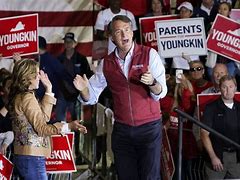
by Tom Blau
Virginia Republicans seem increasingly depressed by November electoral prospects. Many Republicans can’t figure out if the Democrats are more driven by incompetence or fecklessness, but they ask, anyway.
But the more concrete question is: can Democrats, despite everything, nevertheless do well at the polls next month? And if they’re so bad, how determined are Republicans to slam the ball in the net? Maybe not so: on the macro level, the newspapers report population movement from states like New York and California to states like Florida and Texas, attracted by the prospect of not having to self-censor casual conversations. On the “micro level,” they complain that many important campaign jobs—door-to-door canvasser, poll-site greeter, election official, and poll-watcher — are unfilled.
The stakes are high, not just at home. Virginia’s rare election a year before the presidential gives it outsize influence on the country. Virginia is home to many who depend — or do quite well — on a government paycheck. Appeals to liberty or the market, the competitors of government rule, don’t find natural soil. Virginia’s 8.6 million population is driven by the size of Fairfax County (1.1 million), plus Arlington, Alexandria et al among the main D.C. bedroom communities.
The situation is tough. As Damon Runyon, the great chronicler of mid-20th-century Manhattan low-lifes (see Guys and Dolls), put it, surely “The race is not always to the swift, or the battle to the strong — but that’s generally the way to bet.”
But if it were easy to outrun the swift and outfight the strong, who would need campaign volunteers? I’m looking at you, dear reader.
Adversity and low odds are features, not bugs.
Consider some predecessors who fought the odds. Brigadier General Anthony McAuliffe faced disaster in the Battle of the Bulge (1944), commanding outnumbered U.S. soldiers at the vital crossroads of Bastogne, Belgium. When the surrounding Germans’ commander offered surrender or slaughter, McAuliffe instead replied, “NUTS.”
His soldiers laughed and held on until they were reinforced. Or as one of them, Colonel Creighton Abrams, put it, “They have us surrounded again, the poor bastards.”
Some 80 years earlier, Lieutenant General U.S. Grant, slugging it out in Virginia, reported to Washington that, “I propose to fight it out on this line, if it takes all summer,” setting a model of tenacity for Union commanders.
Thomas Payne in the darkness of December 1776 excited his countrymen by saying, “THESE are the times that try men’s souls. The summer soldier and the sunshine patriot will, in this crisis, shrink from the service of their country; but he that stands by it now, deserves the love and thanks of man and woman.”
He also said: ”Tyranny, like hell, is not easily conquered; yet we have this consolation with us, that the harder the conflict, the more glorious the triumph. What we obtain too cheap, we esteem too lightly: it is dearness only that gives everything its value. Heaven knows how to put a proper price upon its goods; and it would be strange indeed if so celestial an article as FREEDOM should not be highly rated.”
There must be something to these themes. They recur in different times-and places. See Shakespeare’s Henry V, especially the brilliant film versions by Kenneth Branagh (1989) and by Laurence Olivier (1944) (both online). The latter, with Winston Churchill’s support, helped rally the British public in World War 2.
The setting is this. The 15th century English King’s army warring in France is not doing well. Yet with the two great speeches that Shakespeare gave him, Henry rallies them to survive and conquer, with these themes:
NEVER SAY DIE.
Once more unto the breach [of fortifications], dear friends, once more;
Or close the wall up with our English dead.
WE FEW ARE ENOUGH
If we are mark’d to die, we are enough
To do our country loss; and if to live,
The fewer men, the greater share of honor.
God’s will! I pray thee, wish not one man more.
We few, we happy few, we band of brothers
“WHAT KIND OF PEOPLE DO THEY THINK WE ARE?” (W. CHURCHILL)
Dishonour not your mothers; attest that those whom you call’d fathers did beget you.
Set an example now to men of lesser value: Show them how to war.
BROTHERS TO THE KING
For he to-day that sheds his blood with me
Shall be my brother no matter how common,
This day shall ennoble him.
IMMORTALITY
He that outlives this day (OCT. 25), and comes safe home, and see old age,
Will stand a tip-toe when this day is nam’d,
Will yearly on the vigil feast his neighbors,
And say “To-morrow is Saint Crispian’s Day.”
Then will he strip his sleeve and show his scars,
And say, “These wounds I had on Crispian’s day.
This story shall the good man teach his son;
And Crispin Crispian shall ne’er go by,
From this day to the ending of the world,
But we in it shall be remembered.
DO YOUR DUTY
And gentlemen in England now-a-bed
Shall think themselves accurs’d they were not here,
And hold their manhoods cheap whiles any speaks
That fought with us upon Saint Crispin’s day.
CHARGE
I see you stand like greyhounds in the slips,
Straining upon the start. The game’s afoot:
Follow your spirit, and upon this charge
Cry ‘God for Harry, England, and Saint George!’
Makes you want to buckle on your broadsword and hand out sample ballots, doesn’t it?
Tom Blau lives in Fairfax, from where he casts a jaundiced eye.

Leave a Reply
You must be logged in to post a comment.